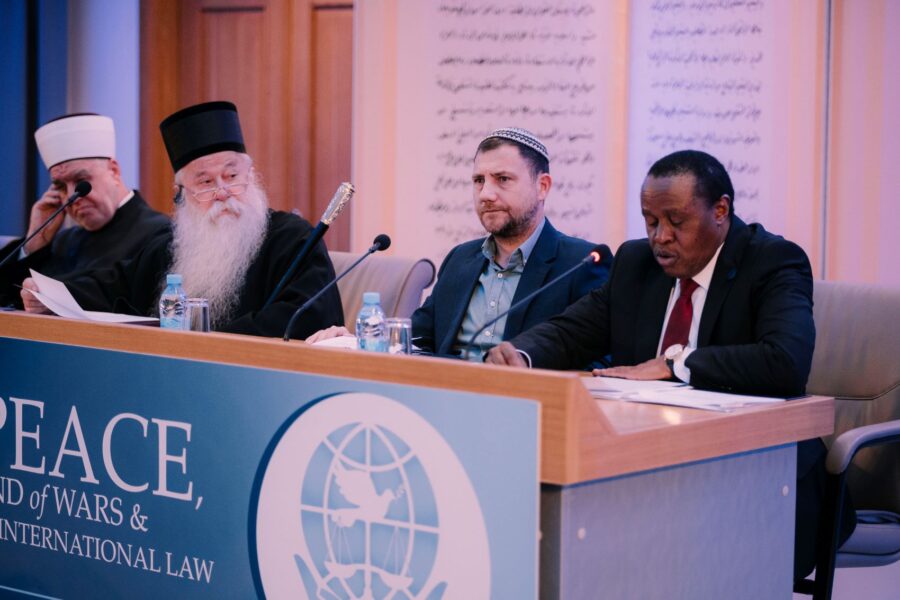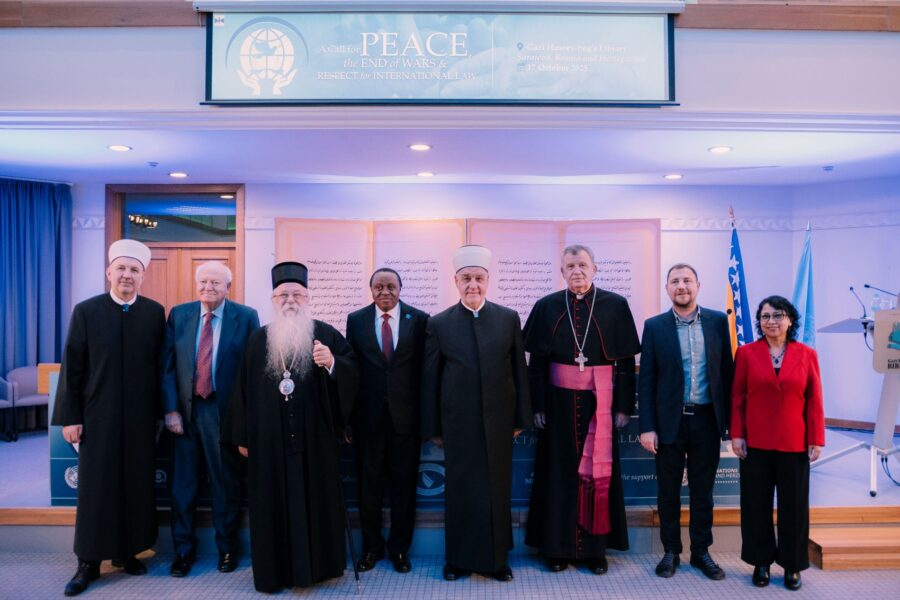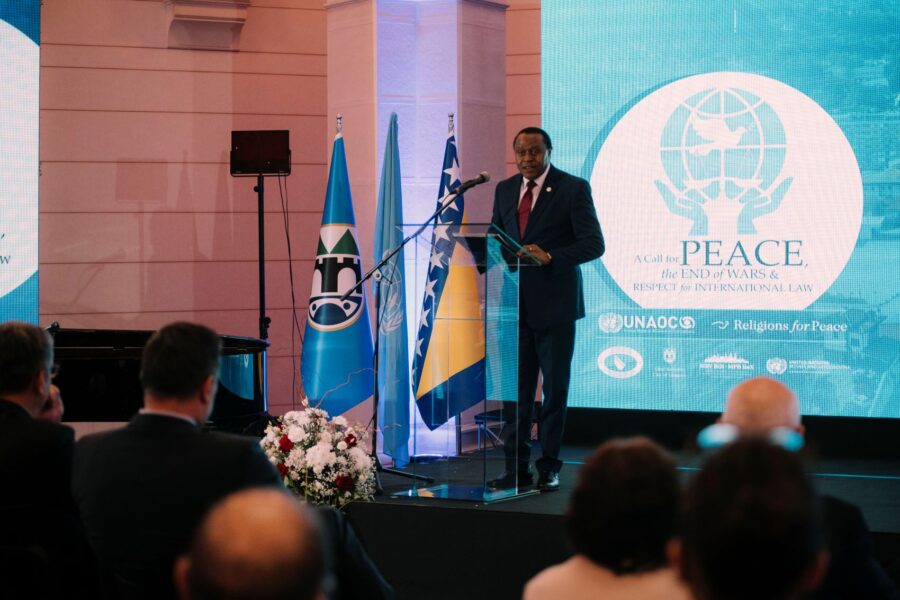Sarajevo’s Call for Peace: Leaders, Faith Actors, Youth, Women, and Civil Society Unite for a Renewed Global Movement to End Wars
October 20, 2025
Sarajevo, Bosnia and Herzegovina, 18 October 2025 – In a moment of urgent global need marked by rising conflict, growing militarization, and deepening polarization, leaders from diverse faiths, youth and women movements, civil society, and public institutions convened in Sarajevo, Bosnia and Herzegovina to call for a united stand: to condemn war, support collaborative peacebuilding, and uphold respect for international law.
The second chapter of “A Call for Peace, the End of Wars and Respect for International Law”, took place in Sarajevo on 16–18 October 2025. An initiative of the United Nations Alliance of Civilizations (UNAOC) and Religions for Peace, the Sarajevo Call for Peace is organized in collaboration with the Ministry of Foreign Affairs of Bosnia and Herzegovina, the City of Sarajevo, the Interreligious Council of Bosnia and Herzegovina, and with the support of the Office of the United Nations Resident Coordinator in Bosnia and Herzegovina.
A Global Movement Anchored in Sarajevo
Launched in Gernika, Spain, in April 2025, the “Call for Peace” is an urgent call for humanity to put an end to the vicious cycle of violence and destruction that pervades our world. The “Call for Peace” continues in Sarajevo, Bosnia and Herzegovina — a city that still bears the deep scars of war, yet stands as a powerful symbol of resilience and renewal. Sarajevo’s story, like that of Gernika, reminds us that from the ruins of conflict can emerge a steadfast commitment to recovery, reconciliation, and hope. Linking Gernika and Sarajevo carries a shared message: the remembrance of war’s tragedies can serve not only as a warning but also as a catalyst for dialogue, understanding, and the building of a more peaceful future.
By uniting global stakeholders and engaging communities most affected by conflict, the initiative aims to amplify the pursuit of a peaceful future for the next generations. Through diplomacy, collaboration, and dialogue, it envisions a world where peace prevails over war.
Future iterations of the global movement are slated for cities historically impacted by conflict, with the third chapter envisaged to take place in Beirut, Lebanon next year.
Amplifying Voices for Peace, Unity, and Justice
As in Gernika, the Sarajevo gathering drew historical parallels to modern-day conflicts and amplified global voices calling for peace, unity, and justice.
The three-day event opened with a reception at the Olympic Museum in Sarajevo, followed by interactive panels featuring faith leaders, youth, women and civil society actors. Key thematic sessions, held at the Gazi Husrevbeg’s Library and the Bošnjački Institute, included:
- Faith in Action: Religious Leaders and Faith Actors as Partners in Fostering Peace, Rebuilding Trust and Promoting Mutual Understanding
- Young People Paving the Way for Peace: From Words to Action
- Women Shaping a Future of Peace: Bridging Gaps in Global Challenges
- Agents of Peace: Civil Society Driving Transformative Change from the Ground Up
The main ceremony took place in the historic Sarajevo City Hall – Vijećnica.

Key Messages:
In his welcome remarks, Mr. Samir Avdić, Mayor of Sarajevo, reminded the world that Sarajevo’s history and resilience symbolize humanity’s enduring hope for peace.
In parallel, H.E. Mr. Elmedin Konaković, Minister of Foreign Affairs of Bosnia and Herzegovina, emphasized, “Our shared task is to ensure that today’s Call for Peace is not just a statement, but a concrete process — one that fosters responsibility, solidarity, and collective action….Let our call for Peace be more than words — let it be a global movement for dialogue, dignity, and reconciliation.”
Under-Secretary-General Miguel Ángel Moratinos, High Representative for the United Nations Alliance of Civilizations and UN Special Envoy to Combat Islamophobia, underscored that peace is not static. It requires constant dialogue and inclusion. “We don’t get peace just by declaring it. Actions need to follow. Real actions, for real long-lasting peace. …My dear friends, humanity must stand together and call for a better world,” he said.
Dr. Francis Kuria, Secretary-General of Religions for Peace, added, “We must act timely in answering the voices, particularly from marginalized communities, which are calling for peace, unity, and justice in order to secure a future of shared, sacred flourishing that lasts for generations.”

H.E. Mufti Dr. Nedžad Grabus — Mufti of Sarajevo, Member of the Assembly of the Interreligious Council in Bosnia and Herzegovina, and Co-President of Religions for Peace — emphasized the city’s multi-religious harmony, stating, “Sarajevo has an open heart. It is a place of peaceful coexistence between people of different religious beliefs.”
Ms. Arnhild Spence, United Nations Resident Coordinator in Bosnia and Herzegovina, said, “Bosnia and Herzegovina’s story is one of resilience, courage and the pursuit of reconciliation. As the United Nations, we’re proud to accompany (the country) on its journey by supporting human rights, fostering social cohesion and upholding international law.”
H.E. Mr. George Andreas Papandreou, Prime Minister of Greece (2009 – 2011), delivered a special address reminding the world that peace begins with our shared will. “When we speak of peace and war, we must remember — It is not destiny. It is a choice. And it’s time to choose peace…Let us choose wisely. Let us choose peace and build a future worthy of the best of us all.”
Mr. José Mari Gorroño, Mayor of Gernika, where it all started, connected two cities that endured conflict — now united in a shared message of remembrance and peace.
Mr. Denis Agović, FIBA 3×3 Professional Athlete, Sports Inclusion Advocate, shared how sport builds inclusion, resilience, and peace. “Through sport, I found strength and purpose. It teaches respect, teamwork & solidarity — values we need for peace.”
Bringing the voice of civil society to the conversation, Mr. Martí Olivella, Promoter of Social Innovation, urged all stakeholders to commit: “War is a human decision and what humans decide, humans can abolish.”
Sarajevo Joint Statement: Moving from Words to Action
The gathering concluded with Mr. Moratinos presenting the Sarajevo Joint Statement, a united call to translate commitments into action. The Statement reaffirms the collective responsibility to reject war, restore trust in international law, and nurture a culture of peace through education, inclusion, and solidarity. Read the joint statement here.
By gathering in Sarajevo and issuing this call for peace, the initiative reinforces that peace is not simply the absence of war—it is the active presence of justice, empathy, and shared humanity. The global movement continues to grow, guided by the conviction that remembrance must fuel renewal, and dialogue must lead to concrete change.